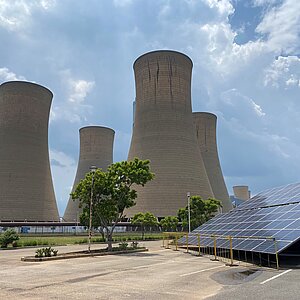Milestone for South Africa’s climate policy

In July, South Africa´s President signed the Climate Change Bill into law, which constitutes a transformational moment in the country´s climate change landscape. The International Climate Initiative (IKI) has been supporting the process for many years.
The African Union Climate Change and Resilient Development Strategy and Action Plan (2022-2032) provides a broad roadmap for African countries in priority and action areas for enhanced climate cooperation and long-term, climate-resilient development. In South Africa, localised policy and implementation is enabled through the country's very own Climate Change Bill. The Bill was signed into law by President Ramaphosa on 23 July 2024.
The Climate Change Bill is an important legal framework that coordinates South Africa’s response to climate change. It represents a crucial step towards comprehensive climate action, with its objectives focused on policy alignment, just transition, cooperative governance, and adaptation and mitigation strategies. The Bill’s enactment into law signals South Africa's commitment to addressing climate change and creating a sustainable future for all.
Process Background
In February 2022, the Department of Forestry, Fisheries and the Environment (DFFE) formally introduced the Climate Change Bill to Parliament. Prior to this, the Bill had undergone extensive public consultations, which were already supported by IKI’s Climate Support Programme - Phase III (CSP3). In October 2023, the National Assembly passed the Bill. It was then sent to the National Council of Provinces for approval, as the Bill needs to be disseminated at a provincial level. All nine provinces adopted the Bill on 25 April 2024.
Key objectives of the Climate Change Act
As one of its many objectives, the Climate Change Act aims to ensure the formal establishment of the Presidential Climate Commission (PCC) and promote an integrated and coordinated government approach through adaptation planning in all sectors as well as at all provincial and municipal levels.
It will facilitate a just transition from the nation's current high-carbon energy system to a decarbonised economy and society, addressing the country’s key developmental needs by creating a sustainable, long-term national greenhouse-gas emissions trajectory in line with the country’s commitments under its updated mitigation Nationally Determined Contribution (NDC). The Climate Change Act further provides a legal framework for assigning sectoral emissions targets (SETs) to relevant sectors and carbon budgets to major emitters.
IKI South Africa’s support for activities aligned with the Climate Change Bill/Act
IKI´s Climate Support Programme (CSP4) has worked closely with DFFE to strategically plan projects that supported the implementation of the Climate Change Bill, now endorsed as the Climate Change Act. IKI-funded projects supporting the Bill are summarised in the diagram below. Furthermore, IKI support to the South African Institute of International Affairs and the IKI Small Grants project with the Southern African Faith Communities' Environment Institute have ensured the participation of youth, women, faith groups and other stakeholders in the development of the Bill.
Adaptation to the impacts of climate change
The CSP4 project was already working closely with DFFE to support both policy and implementation activities related to the Climate Change Bill before it was passed by parliament. The project supported the development and implementation of long-term Adaptation Scenarios, a National Adaptation Strategy, a National Ecosystem Based Adaptation Plan, and is currently working on the development of Climate Risk Profiles and Adaptation Action Plans for priority Human Settlements.
This work has laid the foundation for the implementation work through IKI´s CitiesAdapt project. CitiesAdapt is a global programme that aims to strengthen the climate resilience of cities through capacity building and policy frameworks support, by implementing an adaptation pilot demonstration project, and through vertical integration of adaptation, knowledge exchanges and advocacy. The project is being implemented in the city of uMhlathuze, KwaZulu-Natal.
To date, the project has strengthened the capacities of an estimated 150 people including community members, traditional authorities, scholars, and municipal officials, and is continuing to support the municipality on policy frameworks aligned to the Climate Change Bill and implementation thereof. Thus, the project is supporting the necessary capacity building at municipal level.
Greenhouse gas emissions and removals
The Climate Change Act enables the orderly reduction of greenhouse gas emissions by providing for a climate mitigation system anchored by the Carbon Tax, Carbon Budgets and Sectoral Emissions Targets (SETs).
The CSP4 project is currently supporting DFFE in the development of Sectoral Emissions Targets and company level Carbon Budget and Mitigation Plans regulations and allocations, which constitutes some of the first steps that will be mandated by the Climate Change Act.
The Climate Change Act mandates that, within a year, the DFFE Minister has to compile a list of greenhouse gas emitting sectors and sub-sectors subject to sectoral emissions targets, which will include the obligation for all sector departments to implement, monitor and report on those targets to the DFFE Minister. It even goes as far as to include possible penalties.
Previously, the CSP3 project supported an independent review of South Africa’s seventh Greenhouse Gas National Inventory Report and South Africa’s Low Emission Development Strategy (SA LEDS), as well as providing logistical support for the National LEDS Workshop. The report and strategy are key in implementing the Climate Change Act and adhering to the international reporting requirements under the UNFCCC.
Just Transition to a decarbonised economy
The IKI projects Climate Support Programme and Just Transition to a Decarbonised Economy for South Africa (Just SA) have been supporting the work of the Presidential Climate Commission since its establishment.
The project has provided additional capacity to the Commission and the Mpumalanga Green Cluster Agency (MGCA). By seconding staff and funding work relating to the Just Transition framework, which is grounded by the vision and principles within the Climate Change Act, another area that the JUST SA project is and has been working on is the implementation of pathways towards a just transition to a low-carbon economy and climate-resilient society. This work focuses on economic diversification of the Mpumalanga provincial economy through the MGCA and the stimulation of small and medium sized enterprises (SMMEs) within local municipalities through the SMME finance facility.
Outlook
The Climate Change Act represents a crucial step towards comprehensive climate action in South Africa. Its enactment into law signals South Africa's commitment to addressing climate change challenges and creating a sustainable future for all.
After years of support by the IKI, this critical milestone is an achievement that highlights the significant contribution the IKI can make by improving framework conditions through continuous advice in its priority countries.
The link has been copied to the clipboard
Contact
IKI Office
Zukunft – Umwelt – Gesellschaft (ZUG) gGmbH
Stresemannstraße 69-71
10963 Berlin
The IKI in South Africa
Related Videos
Related Publications
-

-
10/ 2024 | Tool/Open source product
GIZ CitiesAdapt's Toolbox and Resource Library
English (PDF, 276 KB)
-
10/ 2024 | Tool/Open source product
GIZ CitiesAdapt's Repository of Tools and Resources
English (ZIP, 3 MB)












